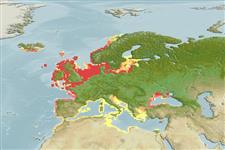Environment: milieu / climate zone / depth range / distribution range
Ecologia
marinhas; estuarina demersal; oceanódromo (Ref. 51243); intervalo de profundidade 20 - 70 m (Ref. 6302). Temperate; 70°N - 30°N, 25°W - 42°E
Northeast Atlantic: throughout the Mediterranean and along the European coasts to Arctic Circle; also found in most of the Baltic Sea. Subspecies Psetta maxima maeotica in the Black Sea.
Length at first maturity / Tamanho / Peso / Idade
Maturity: Lm 40.8, range 41 - 54 cm
Max length : 100.0 cm SL macho/indeterminado; (Ref. 4703); common length : 50.0 cm TL macho/indeterminado; (Ref. 35388); common length :70 cm TL (female); peso máx. Publicado: 25.0 kg (Ref. 9988); Idade máx. registada: 25 anos (Ref. 32766)
Body almost circular. Eye side without scales but with large bony tubercles (Ref. 35388).
Adults live on sandy, rocky or mixed bottoms; rather common in brackish waters. Feed mainly on other bottom-living fishes (sand-eels, gobies, etc.), and also, to a lesser extent, on larger crustaceans and bivalves. Batch spawner (Ref. 51846). Spawning season is between April and August; pelagic eggs. May reach 25 kg (Ref. 9988). Highly esteemed food fish. Utilized fresh or frozen; eaten steamed, pan-fried, broiled, boiled, microwaved and baked (Ref. 9988).
Spawning usually happens between the months of February and April in the Mediterranean and from May to July in the Atlantic. Sequenced spawning every 2-4 days. Eggs have a single fat drop. Larvae are initially symmetric but, at the end of the metamorphosis (day 40-50, 25 mm), the right eye moves to the left side, losing its initial bilateral symmetry. Egg size 0.9 - 1.2 mm, larval length at hatching 2.7-3.1 mm.
Bauchot, M.-L., 1987. Poissons osseux. p. 891-1421. In W. Fischer, M.L. Bauchot and M. Schneider (eds.) Fiches FAO d'identification pour les besoins de la pêche. (rev. 1). Méditerranée et mer Noire. Zone de pêche 37. Vol. II. Commission des Communautés Européennes and FAO, Rome. (Ref. 3397)
Categoria na Lista Vermelha da IUCN (Ref. 130435)
Ameaça para o homem
Harmless
Utilização humana
Pescarias: espécies comerciais; Aquacultura: espécies comerciais; peixe desportivo: sim; Aquário: Aquários públicos
Ferramentas
Relatórios especiais
Descarregue XML
Fontes da internet
Estimates based on models
Preferred temperature (Ref.
123201): 5.9 - 11.9, mean 9.4 °C (based on 239 cells).
Phylogenetic diversity index (Ref.
82804): PD
50 = 0.5645 [Uniqueness, from 0.5 = low to 2.0 = high].
Bayesian length-weight: a=0.01122 (0.00922 - 0.01365), b=3.06 (3.00 - 3.12), in cm total length, based on LWR estimates for this species (Ref.
93245).
Nível Trófico (Ref.
69278): 4.4 ±0.0 se; based on diet studies.
Generation time: 4.8 (3.8 - 5.8) years. Estimated as median ln(3)/K based on 24
growth studies.
Resiliência (Ref.
120179): Médio, tempo mínimo de duplicação da população 1,4 - 4,4 anos (K=0.15-0.28; tm=3-5; tmax=26; Fec=5 million).
Prior r = 0.50, 95% CL = 0.33 - 0.74, Based on 9 stock assessments.
Fishing Vulnerability (Ref.
59153): High vulnerability (60 of 100).
Climate Vulnerability (Ref.
125649): High vulnerability (65 of 100).
Nutrients (Ref.
124155): Calcium = 28.5 [12.1, 48.8] mg/100g; Iron = 0.144 [0.058, 0.649] mg/100g; Protein = 19.5 [18.0, 21.0] %; Omega3 = 0.275 [0.153, 0.500] g/100g; Selenium = 14.1 [6.4, 33.9] μg/100g; VitaminA = 8.19 [2.10, 35.13] μg/100g; Zinc = 0.156 [0.092, 0.524] mg/100g (wet weight); based on
nutrient studies.
